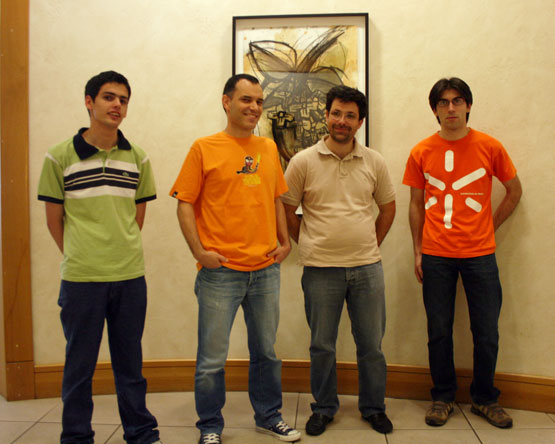Advanced Computing students conduct research at UT Austin
Interdisciplinary research,
education and capacity building
13 May 2010
We spoke to five Portuguese PhD students about their work, the UT approach to graduate education, and life in Austin.
This spring the CoLab Advanced Computing program welcomed Rui Gonçalves, Reus Salini, Edgar Sousa, João Barbosa, and Diogo Neves to spend several months at UT Austin. While here the students are collaborating with the Department of Computer Science, the Department of Electrical and Computer Engineering, the Institute for Computational Engineering and Sciences (ICES), the Texas Advanced Computing Center (TACC) and the Center for Transportation Research (CTR).
Their research covers a broad range of topics in the field of advanced computing. João Barbosa is currently examining high-performance computer graphics. “My focus is heterogeneous and core platforms for real-time ray tracing. The goal of my research is to explore and develop efficient scheduling mechanisms for distributed heterogeneous platforms for real-time problems, such as ray-tracing and ray casting (volume rendering),” Barbosa said.
Reus Salini's work may save countries millions of dollars in infrastructure costs. He is researching the application of neural networks to the modeling of asphalt pavement, hoping to make breakthroughs in longstanding civil engineering problems through recent advances in computing power.
Several of the students are working to improve the practice of parallel computing itself. “I am working on parallel programming methodologies that improve modularity and promote the incremental development of parallel applications,” Rui Gonçalves said. Diogo Neves' focus is “to raise the abstraction level of parallel programming by developing a new set of constructs that promote a stronger separation of concerns in parallel computing. The idea is to separate the domain-specific code from parallelization issues – that is, to hide the complexity of parallel programming as much as possible,” Neves said. (For more on Neves' topic, see "Separation of Concerns in Advanced Computing.")
Some students assist UT professors with their research. Edgar Sousa's interests lie in “aspect-oriented programming to develop tools for (semi-)automatic parallelization of legacy scientific codes,” he said. “I am working closely with Professor Keshav Pingali and his research team and taking part in the development of the Galois framework.”
Whereas the students know and love their research, the CoLab program introduces them to unfamiliar topics. Diogo Neves explained how his time with CoLab changed his understanding of UT’s reputation. “Before attending UT, I knew that it was recognized as a top university. After being here, I’m realizing that it’s at the top because” it’s home to great scientists and “several top research groups, such as Dr. Keshav Pingali’s group, with whom I am developing my work. It seems that tight relations between UT and the outside world exist which enable UT scientists to perform applied science,” Neves said. According to Rui Gonçalves, UT researchers focus on smaller problems than their Portuguese counterparts but are able to explore the problems more deeply. However, the biggest difference between graduate education programs in both countries is the amount of time spent in classrooms. In Austin, students “spend less time listening to the professor in a classroom” and more time doing homework and other assignments outside of class, Gonçalves said. Variety is another differing factor. “The freedom of choice related to the curriculum” is much greater in Austin, João Barbosa said.
There are more educational and research-related resources at UT, Barbosa added. Many UT researchers and visitors from other institutions give talks outside of class schedules. Neves elaborated, “Is there a day without a seminar? No! It is really awesome!” Another benefit of CoLab participation is the development of professional soft skills. Edgar Sousa plans to use the teamwork and team management skills he is learning from CoLab in his future work with Portuguese research teams.
Technical resources offer another appeal for many CoLab participants. Reus Salini plans to use TACC’s supercomputer to process his “large databases and, together with UT’s team, start a deep cooperation between the advanced computing and pavement engineering areas,” Salini said. “While Portugal is just starting to create its own infrastructure, UT has a rock-solid infrastructure with which to develop world-class research.”
CoLab offers students the opportunity to come to Austin under several different initiatives: as members of FCT-funded R&D projects, as students formally accepted into UT Austin PhD programs or as participants in CoLab's professional internship program. Opportunities are regularly announced at http://utaustinportugal.org. “Just learn to cook before coming to Austin. Trust me, the first few months are awful to endure without the food we are used to,” advises Edgar Sousa. João Barbosa puts it another way, “Prepare yourselves for a different reality.”

(Left to right: Edgar Sousa, Diogo Neves, João Barbosa and Rui Gonçalves. Not pictured: Reus Salini.)

 News
News
